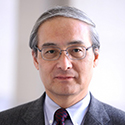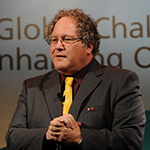
The USC U.S. - China Institute, Japan Society New York, and National Consortium for Teaching about Asia (NCTA) are offering a complimentary one-day workshop on Japan at USC for educators.
In this workshop, we’ll learn about Japan’s postwar development into a prosperous, generous and democratic nation. We’ll pay particular attention to the role of the United States in this process and Japan’s subsequent ties with America. Japan’s distinct business culture will be examined and we’ll discuss how film illuminates social changes since 1945.
Presenters
Fumiaki Kubo, University of Tokyo
US-Japan Relations Since World War II

Fumiaki Kubo is Barton Hepburn Professor of American Government and History at the Graduate Schools for Law and Politics, University of Tokyo. His areas of expertise are US political and diplomatic history, modern American parties, policy making, and US foreign policy. He was a Fulbright scholar at Georgetown University and the University of Maryland, and, from 2001 to 2002, a member of Prime Minister Junichiro Koizumi’s discussion panel on a direct election system. He is currently a member of the U.S.-Japan Conference on Cultural and Educational Interchange (CULCON). He has been a Japan scholar in the Asia Program of the Woodrow Wilson International Center for Scholars since 2014 and a member of the Basic Policy Working Group of the Space Policy Commission, Cabinet Office.
Ulrike Schaede, University of California San Diego
Japanese Business: Successes and Challenges
 Ulrike Schaede is a professor of Japanese business and the founding director of the Japan Forum for Innovation and Technology. Her core research interest is to analyze and juxtapose different systems of capitalism and ways of organizing business, in order to identify the social and economic efficiency consequences of these differences. In particular, Schaede has looked at Japanese corporate strategies in light of Japan’s financial market organization, regulation and government-business relationships, corporate governance and takeovers, antitrust, employment practices, and innovation policies, and entrepreneurship. She is an expert on current affairs of Japanese companies and industry dynamics, as well as policy initiatives and the historical background to ongoing reforms.
Ulrike Schaede is a professor of Japanese business and the founding director of the Japan Forum for Innovation and Technology. Her core research interest is to analyze and juxtapose different systems of capitalism and ways of organizing business, in order to identify the social and economic efficiency consequences of these differences. In particular, Schaede has looked at Japanese corporate strategies in light of Japan’s financial market organization, regulation and government-business relationships, corporate governance and takeovers, antitrust, employment practices, and innovation policies, and entrepreneurship. She is an expert on current affairs of Japanese companies and industry dynamics, as well as policy initiatives and the historical background to ongoing reforms.
Kerim Yasar, USC
Giants and Toys: The Americanization of Japanese Business?
 Kerim Yasar specializes in modern Japanese literature and cinema, media history, and translation studies. He has translated in a variety of genres and media, from contemporary novels to pre-modern poetry to the subtitles for more than a hundred feature films in the Criterion Collection/Janus Films library. His first book, Electrified Voices: How the Telephone, Phonograph, and Radio Shaped Modern Japan, 1868-1945 (Columbia University Press, 2018), examines the roles played by the telegraph, telephone, phonograph, radio, and sound film in the discursive, aesthetic, and ideological practices of Japan from 1868 to 1945.
Kerim Yasar specializes in modern Japanese literature and cinema, media history, and translation studies. He has translated in a variety of genres and media, from contemporary novels to pre-modern poetry to the subtitles for more than a hundred feature films in the Criterion Collection/Janus Films library. His first book, Electrified Voices: How the Telephone, Phonograph, and Radio Shaped Modern Japan, 1868-1945 (Columbia University Press, 2018), examines the roles played by the telegraph, telephone, phonograph, radio, and sound film in the discursive, aesthetic, and ideological practices of Japan from 1868 to 1945.
Clayton Dube, USC
Teaching about Contemporary Japan

Clay Dube and the institute are focused on informing public discussion about the importance and evolving nature of U.S.-China relations. Dube teaches Chinese history and studies the role of the media in U.S.-China relations.
QUESTIONS? CONTACT asiak12@usc.edu or 213-821-4382
SPONSORED BY

with financial support from an anonymous donor and the Freeman Foundation.


